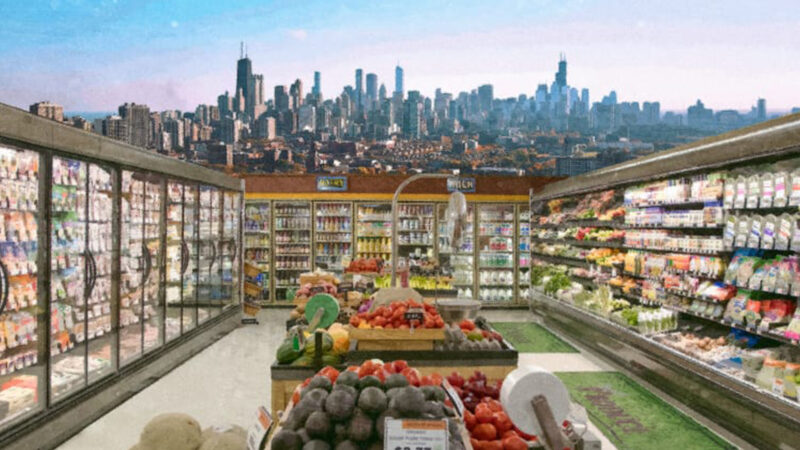In the Media
FAST COMPANY: Chicago wants to open a city-run grocery store. It could be the solution to urban food deserts
08. 27. 2024
With tight profit margins, many grocery chains have pulled out of lower-income neighborhoods. Cities like Chicago could fill the gap themselves.

Fast Company originally published this story.
Aldi, Whole Foods, Walmart, Save a Lot: These grocery stores have become a sad commentary on the challenges facing historically disinvested communities in Chicago. In the past few years, all these franchises have shuttered locations, citing financial challenges, with six stores closing in the last two years alone. Residents have grown increasingly frustrated at efforts to bring better food to their neighborhoods.
That’s why Chicago is making plans to potentially open a store of its own. Mayor Brandon Johnson’s office commissioned a feasibility study, delivered earlier this month, looking into the idea of establishing a city-run grocery store, which would make Chicago the first major U.S. city to do so. The report, by HR&A Advisors, found that the city could establish a three-store network that would fill its food deserts for $26.7 million in upfront investment.
“There are places in both urban and rural communities where the market doesn’t meet the moment,” says Ameya Pawar, a former Chicago alderman who now works for the Economic Security Project, a nonprofit focused on fighting inequality. “What we need in communities is banks and grocery stores and pharmacies that are permanently tethered to the community. The demands of shareholders shouldn’t be tied to the health and wellbeing and lifespan of local stakeholders.”
Pawar, whose group provided grant funding for the city to undertake the feasibility study, argues that policymakers have already tried multiple incentives, including cash subsidies and tax credits, to get the grocery industry to open stores where they’re needed most, and as the rollcall of closings suggests, they haven’t been enough to stem the tide or improve access to fresh food.
In Chicago neighborhoods like West Englewood and East Garfield Park, which have median household incomes below $32,000, 63.5% and 52% of residents, respectively, currently live more than a half mile from a grocery store. The official USDA definition of a food desert is a significant population far from food resources: half a mile in urban areas, or 10 miles in a rural area.
But the players in these largely consolidated industries aren’t looking at the health and wellness of underserved communities as part of their bottom line. A public option in this case, akin to publicly owned power utilities, makes sense, says Pawar, since it fills a gap the traditional market isn’t or can’t.
Roughly 39 million Americans, or 13% of the population, live in a food desert, per 2022 USDA data. There’s a clear need for such mission-driven stores, operated by cities or nonprofits. But success can be challenging.
Smaller grocers, especially nonprofits or community-run stores, face daunting hurdles in the marketplace. Grocery already has a thin profit margin, often under 1%, so operating in a neighborhood without the high incomes needed to afford expensive purchases, and without the purchasing power of a large national chain, becomes an uphill battle.
Numerous city-run stores have come and gone in recent years. In Baldwin, Florida, a store that opened in 2019 closed its doors in March, citing challenges making a profit. Mayor Sean Lynch, who championed of the store in the rural town of 1,400, in part to help seniors get access to fresh food, said it was too hard to compete with larger chains that could buy at volume for lower prices. Rural Erie, Kansas, which bought out a community grocer a few years ago, was forced to close its Erie Market earlier this month.
There have been successes. In the north side of Waco, Texas, a Christian nonprofit called Mission Waco has run the Jubilee Food Market since 2017, part of its constellation of community businesses, including a clothing store and cafe. Jubilee also faces economic challenges and has struggled to run a profit, says Kathy Wise, Mission Waco’s Associate Executive Director. In addition to struggles common to similar stores, it doesn’t sell tobacco or alcohol products, which tend to have higher margins.
But the group pays its employees more than minimum wage, and offers affordable staples in an area that needs it, one that traditional economic development has largely passed by.
“We know a business is not going to necessarily run a profit here, especially a grocery store, but it was needed,” says Wise. “Our mission is empowerment.”
Part of the problem facing these kinds of stores, Pawar argues, is measuring success by the same profit metrics of a massive corporate grocery chain, as opposed to weighing their community benefits. In addition, there’s lots of assistance a city could provide to such an enterprise, such as gifting it city-owned land, including with an existing facility that could be turned into a store, which would significantly lower tax and rent burdens and improve operational costs. There are already billions of dollars in annual government subsidies across the food chain; why not add another that guarantees healthy food to those who need it? Ideally, the city of Chicago would apply for a new state of Illinois grant program to help establish new grocers in food deserts.
In Chicago, S. Mayumi “Umi” Grigsby, the mayor’s policy chief, told the Chicago Sun-Times the city would be working with community groups, philanthropies, and retail experts to figure out strategy and next steps.
“This isn’t like some market takeover,” says Pawar, “This is the state putting forward capital so that every community has the freedom and choice to figure out how to make food accessible to people.”